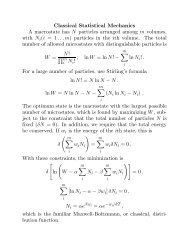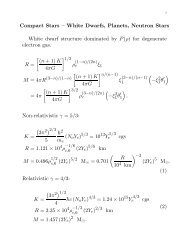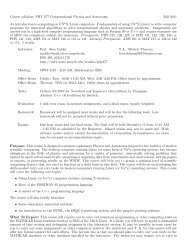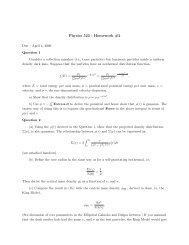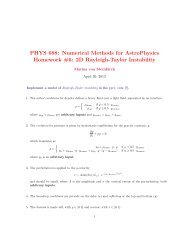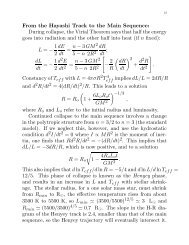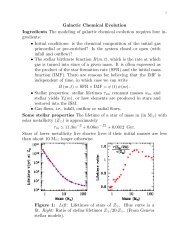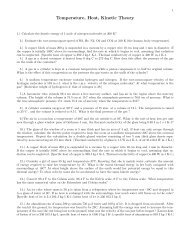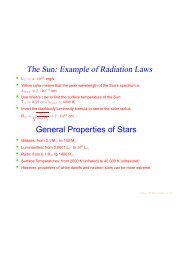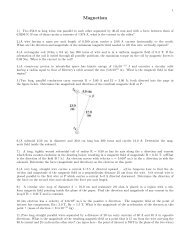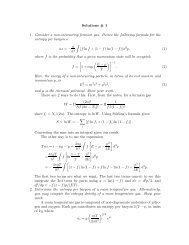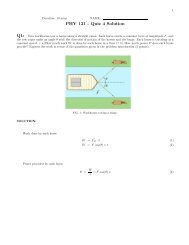printable - Stony Brook Astronomy - Stony Brook University
printable - Stony Brook Astronomy - Stony Brook University
printable - Stony Brook Astronomy - Stony Brook University
Create successful ePaper yourself
Turn your PDF publications into a flip-book with our unique Google optimized e-Paper software.
4.8 Graduate study in Physics<br />
As a Bachelor of Physics and/or <strong>Astronomy</strong>, you will have a strong background of the main themes of the discipline. About<br />
one third of the recipients of bachelors degrees in physics go on to seek graduate degrees to obtain deeper training and to carry<br />
out original research in a sub-field of physics. If you are curious about graduate school opportunities, contact Prof. Peterson<br />
and Prof. Michael Gurvitch (Michael.Gurvitch@stonybrook.edu, D-137, 632-8049) who is the senior adviser and who provides<br />
special guidance to students considering their options as they complete their bachelors degree.<br />
4.8.1 PhD programs<br />
For those students emerging from a B.S. program with student loan commitments weighing on their minds, it is important to<br />
note that most students in Ph.D. programs receive a teaching or research assistant stipend and a tuition waiver. You won’t get<br />
rich during your graduate studies, but you are able to live modestly without needing to seek additional financial aid (and you<br />
can often defer payment of any student loans you might have from your undergraduate years until you have completed your<br />
graduate degree program).<br />
Note that most Ph.D. programs require you to gain some teaching experience (e.g., as a laboratory teaching assistant) as<br />
part of obtaining the degree. Doing this during your first year of graduate school is often a good idea; you then take one fewer<br />
course, and you spend some of your time interacting with undergraduates and doing something socially useful.<br />
Having said that, it can also be a very nice thing to seek your own fellowship, especially if you want to spend a year<br />
abroad before coming back to the US for the rest of your graduate study. One program of this type is the Fulbright program<br />
36 jointly administered by the US Department of State 37 , the J. William Fulbright Foreign Scholarship Board 38 , and<br />
the Institute of International Education 39 . <strong>Stony</strong> <strong>Brook</strong> students thinking of applying should contact Elizabeth Barnum<br />
(Elizabeth.Barnum@stonybrook.edu, phone 632-4685) in the Graduate School 40 at <strong>Stony</strong> <strong>Brook</strong>. Deadline for applications<br />
for academic year 2003-2004 is September 30, 2002. Another option is provided by the National Science Foundation, which<br />
has a graduate fellowship program 41 with an application deadline of November 7, 2002. Both of these programs require that<br />
you be a U.S. citizen at the time of your application.<br />
How to pick a graduate school The American Institute of Physics provides a great starting point at the web site<br />
www.gradschoolshopper.com. There are of course various external rankings 42 of Physics and <strong>Astronomy</strong> PhD programs out<br />
there. Based on rankings provided by the National Research Council, the web site www.phds.org has a program by which you<br />
can enter your priorities and retrieve a list of the top 50 or so schools ranked according to your priorities and their database.<br />
This can be very useful, but don’t take the ranking too seriously. Consult professors here about their views on the rankings.<br />
For example, our own department got poorly treated. Apparently someone sent data for the physics department with the Yang<br />
Institute for Theoretical Physics (YITP) excluded, and based on these data <strong>Stony</strong> <strong>Brook</strong> ranks somewhere close to 20, while if<br />
YITP data had been included properly, the rank would have been close to 10.<br />
The shortage of qualified applicants has recently been felt in Europe as well as in the US. Therefore, now is a better time<br />
than ever before to consider graduate study abroad, if your tastes run in this direction. For example, a good program has recently<br />
been announced in Stuttgart, called the International Max Planck Research School for Advanced Materials 43 . You can find a<br />
good supply of courses in English, and learn (or even fail to learn) German at your own pace.<br />
4.8.2 Masters degree programs<br />
The PhD is a goal for many but does not always make sense. It typically takes 5-6 years to obtain a PhD after receiving the<br />
bachelors degree (the normal range is between 3.5 and 8 years). The first year is often quite demanding as you prepare for<br />
comprehensive exams and take core courses, uncertain of whether the goal is attainable. Once you get past this, you go about<br />
finding the right subfield, project, and thesis adviser. It can be a great experience, but there are no guarantees, and there have<br />
been times (in particular in the early 1990s) when the PhD hasn’t always led to a satisfying career or employment in science.<br />
36 http://www.iie.org/Template.cfmSection=Education&Template=/Activity/ActivityDisplay.cfm&activityid=54<br />
37 http://www.state.gov<br />
38 http://www.iie.org/Template.cfmTemplate=/programs/fulbright/fulboard.htm<br />
39 http://www.iie.org<br />
40 http://www.grad.sunysb.edu/<br />
41 http://www.ehr.nsf.gov/dge/programs/grf/<br />
42 http://insti.physics.sunysb.edu/physics/rankings.htm<br />
43 http://www.imprs-am.mpg.de/<br />
29



